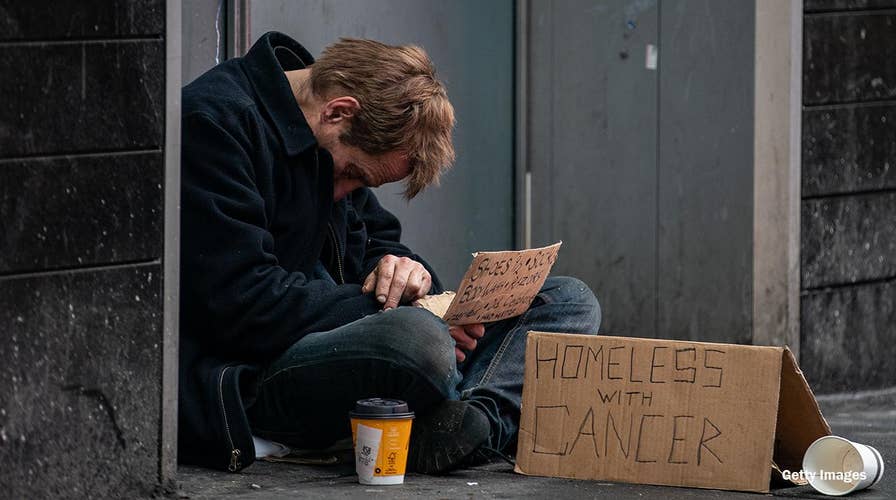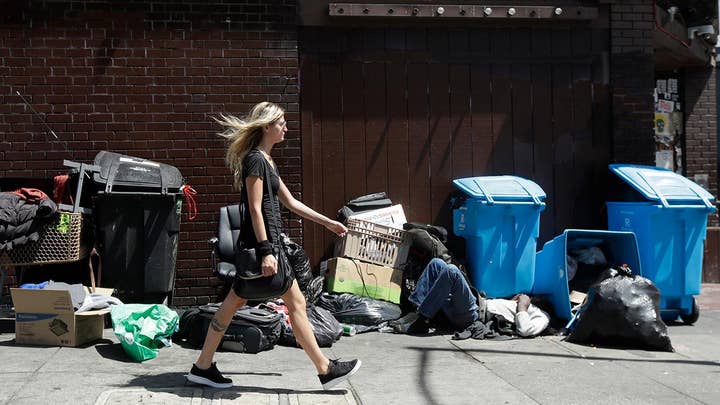NYC’s homeless are suffering amid de Blasio mismanagement, critics say
Kathryn Kliff, an attorney for the Legal Aid Society’s Homeless Rights Project, and David Salvatore, a member of the Providence City Council in Rhode Island, speak about the de Blasio administration's plan to relocate NYC's homeless population to other states and why some jurisdictions are completely unaware of the move.
Like several other major cities, New York is feeling the effects of the homelessness crisis. The last homelessness survey was taken in January of 2019 by "Continuums of Care," which passed the data along to the Department of Housing and Urban Development (HUD). Here are the numbers.
In 2019, the overall number of homeless residents was 78,604. The vast majority of them, 74,982, were in shelters while 3,622 were not. This represents a slight decrease from 2018 when the total number was 78,676, with 74,965 in shelters or transitional housing and 3,711 being unsheltered.
There were 13,806 homeless family households with at least one adult and one child in 2019, compared to 14,261 in 2018. In both years, all of the families were in some type of shelter or housing.
The number of unaccompanied youths under the age of 25 stood at 2,263 in 2019. This marks a slight uptick from the 2,142 youth without a home in 2018.
Issues with New York's homeless population have made headlines over the past two years, with many incidents occurring on the subways or near underpasses, where encampments have emerged.
HOMELESSNESS IN WASHINGTON, DC: HERE ARE THE STATISTICS
In September 2019 it was revealed there had been dozens of complaints about the condition of the city's subway trains, specifically about the presence of fecal matter, according to documents obtained by The New York Post.
In October 2019 a homeless man named Randy Santos, 24, murdered four other homeless men with a metal pole while they were sleeping, while a fifth victim was taken to the hospital to be treated for head wounds, The Wall Street Journal reported.
A Metropolitan Transportation Authority (MTA) Taskforce report from October 2019 showed the number of homeless people living on the subway had gone up by 20 percent since 2018, ABC 7 discovered. The total number of homeless living on the trains stood at 2,178, as of last fall.
Trains were delayed 659 times by homeless people in 2018, according to the MTA.
CLICK HERE FOR THE FOX NEWS APP
In an effort to combat the crisis, New York City's Democratic Mayor Bill de Blasio announced "The Journey Home" initiative in December of 2019.
It promised to “end long-term street homelessness as we know it” by bringing thousands of people off of the streets and into permanent or transitional housing within the next five years.
The city will spend an estimated $120 million in 2020 on the plan, which will aim to create 1,000 new permanent apartments. It will also generate 1,000 additional “Safe Haven” shelter beds and expand personal outreach into the subway system.
A May 2019 report from the city's comptroller office found that between 2014 and 2019, citywide spending on homelessness more than doubled, to $3.2 billion. The same report showed shelter costs more than doubling over that same period, to $1.9 billion in 2019
Despite these spikes in spending, between April 2014 and April 2019, there has been an 11.5 percent increase in the official New York City shelter census.



